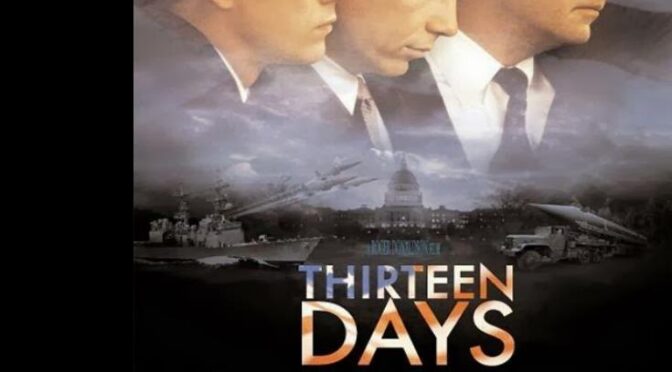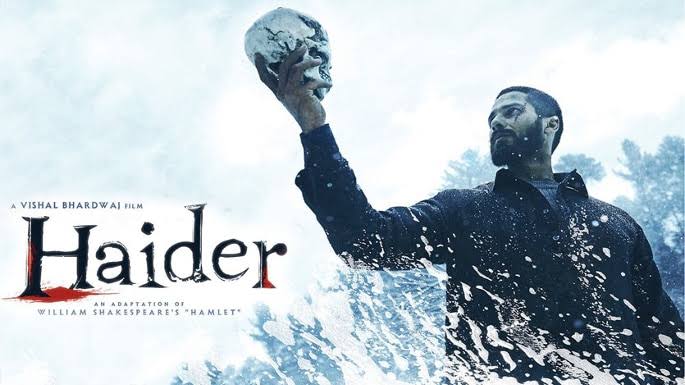Thirteen Days (2000): A Closer look at History, Power & Diplomacy
Posted on : February 26, 2025Author : Sneha Chatterjee

Directed by: Roger Donaldson
Starring: Bruce Greenwood (as President John F. Kennedy)
Kevin Costner (as Kenneth O’Donnel)
Steven Culp (as Robert Kennedy)
Drake Cook (as Mark O’Donnel)
Thirteen Days (2000), directed by Roger Donaldson, brings to life the 1962 Cuban Missile Crisis, one of the most perilous moments in world history. With nuclear war looming, the film takes us behind the scenes, showing how John F. Kennedy (Bruce Greenwood), his brother Robert Kennedy (Steven Culp), and their close advisor Kenny O’Donnell (Kevin Costner) navigated a high-stakes geopolitical confrontation with the Soviet Union. The movie explores the intricate balance of diplomacy, military strategy, and Presidential decision-making under pressure. However, while the film is undeniably compelling, it risks oversimplifying the complexities of history by presenting a one-dimensional narrative that frames the U.S. as the rational peacekeeper, while sidelining the agency of other key players, particularly the Soviet Union and Cuba.
Set in October 1962, the film follows the Kennedy administration’s response to the discovery of Soviet nuclear missiles in Cuba. Through the lens of Kenny O’Donnell, a special assistant to the president, we witness the tense deliberations inside the White House as the U.S. faces the risk of nuclear war. The central conflict arises when U-2 spy plane photographs confirm Soviet missile installations in Cuba—just 90 miles from the U.S. mainland. This revelation triggers immediate alarm, with military leaders urging swift airstrikes or even an invasion. However, Kennedy and his advisors seek a diplomatic alternative, fearing that any direct attack could escalate into a full-scale war with the Soviet Union. What follows is a 13-day standoff, filled with miscalculations, miscommunications, and psychological brinkmanship. The administration imposes a naval blockade (reframed as a “quarantine), preventing Soviet ships from delivering more missiles. Ultimately, Kennedy and his team engage in backchannel diplomacy to strike a secret deal—the Soviets agree to withdraw their missiles from Cuba in exchange for a U.S. pledge not to invade Cuba and a quiet removal of American missiles from Turkey.
While Thirteen days effectively dramatizes the crisis, it also reinforces a historical narrative that simplifies the complexities of the Cold War. The film presents Kennedy and his close circle as the sole architects of peace, crafting a myth of American exceptionalism that positions the U.S. as the pillar of rationality and diplomacy amidst a ‘threatening world’. This framing of American exceptionalism is not just a reflection of the past but it continues to echo in the present U.S. Foreign Policy, where American interventionism is often justified in the name of global stability and security. This ideological framing overlooks the complexities of the situation, reducing the Soviet role to mere antagonism and sidelining the Cuban perspective almost entirely. It disregards the geopolitical realities that led Khrushchev to install missiles in Cuba in the first place. In reality, the Soviets were responding to U.S. Jupiter missiles stationed in Turkey, which directly threatened Soviet security. By failing to explore Khrushchev’s motivations beyond mere aggression, the film aligns with the depiction of the Soviet Union as an “evil empire” rather than a state engaging in strategic deterrence.
Moreover, one of the most striking omission in Thirteen Days is the Cuban perspective. While the crisis played out as a confrontation between two superpowers, Cuba was not merely a passive battlefield for U.S.-Soviet tensions. Fidel Castro actively sought Soviet missiles as a deterrent against a U.S. invasion, fearing another attack after the failed Bay of Pigs invasion in 1961. Castro’s defiance and willingness to resist American intervention were critical to the crisis, yet his role is largely absent from the film’s narrative. By erasing Cuba’s agency, Thirteen Days mirrors broader Cold War historiography that often-reduced Global South nations to mere chess pieces in a superpower conflict. It does not engage with how smaller nations, especially in the Global South, were directly impacted by and involved in Cold War dynamics.
While the film rightfully emphasizes Kennedy’s preference for diplomacy over military escalation, it oversimplifies the internal power struggles within the U.S. government. The depiction of Kennedy as a lone voice of reason against an overly aggressive military establishment reinforces a heroic image that downplays the political realities of the time. The U.S. was not merely a rational actor seeking peace—it was also a global superpower committed to maintaining military dominance. The decision to remove U.S. missiles from Turkey was kept secret to maintain the perception of American strength, illustrating the administration’s concern with power dynamics as much as with diplomacy.
The U.S. still follows containment strategies similar to those used during the Cold War, especially in its dealings with China and Russia. Tensions between the U.S. and China over Taiwan reflect the same kind of challenges seen in the Cuban Missile Crisis, where both sides must balance military threats with the danger of war. Likewise, the conflict in Ukraine has brought back fears of nuclear threats, with Russia using its nuclear weapons to discourage Western involvement.
By framing the Cuban Missile Crisis primarily as a triumph of American diplomacy, Thirteen Days inadvertently reinforces a narrative that justifies U.S. interventionism in global conflicts. The notion that American leadership is necessary to prevent catastrophe echoes in contemporary foreign policy, where U.S. military presence is often portrayed as a stabilizing force. However, as history has shown, interventionist policies frequently lead to prolonged conflicts rather than peace. Thirteen Days is both a compelling political drama and a reflection of American political myth-making. While it succeeds in portraying the tension and uncertainty of the Cuban Missile Crisis, it ultimately tells a selective version of history—one that outs the U.S. at the center, while downplaying the agency of other actors. The film’s depiction of Kennedy as the sole architect of peace reinforces the enduring myth of American exceptionalism, a narrative that continues to shape global perceptions of U.S. foreign policy.
At its core, Thirteen Days is not just a retelling of history but a construction of it. The way the crisis is framed influences how audiences perceive Cold War diplomacy, shaping broader understandings of U.S. interventionism and global power dynamics. While the film provides valuable insight into the pressures of crisis decision-making, it also serves as a reminder that history is often told through the lens of those who wield power. As global conflicts continue to test the limits of diplomacy, the lessons of Thirteen Days remain relevant, not just for understanding the past, but for critically examining the narratives that shape our present.
Sneha Chatterjee
M.A. Political Science
St. Xavier’s College(Autonomous), Kolkata
Intern, Asia in Global Affairs
Disclaimer: The views and opinions expressed in this film review are those of the author and do not necessarily reflect the official policy or position of Asia in Global Affairs. The review is intended for academic and informational purposes only. It is not an endorsement of any particular viewpoint, nor is it intended to malign any individual, group, organization, company, or government.





Leave a Reply